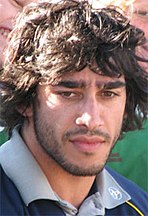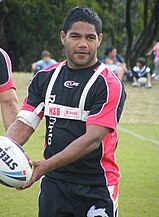Murri people
| Regions with significant populations | |
|---|---|
| Queensland, North West New South Wales | |
| Languages | |
| English, Maric languages (e.g. Darumbal), Bundjalung, Djabugay, Dyirbal | |
| Related ethnic groups | |
| Koori peoples, Nunga, Nyoongar, Palawah, Wangai, Yamatji |
Murri is a demonym for Aboriginal Australians of modern-day Queensland and north-western New South Wales. For some people and organisations, the use of Indigenous language regional terms is an expression of pride in their heritage. The term includes many ethno-linguistic groups within the area, such as the Kamilaroi (Gamilaraay) and Yuggera (Jagera) peoples.
Many Murri people play rugby league, and the annual Murri Rugby League Carnival is a big event in the sporting calendar.
History[]
Many Murri were forcibly removed from their land, and placed on missions and Aboriginal reserves with other tribes with whom their relations may not have been friendly. From 1900 until 1972, a substantial number of Murri children became part of the Stolen Generations.[1]
Along with all Australian Aboriginal people they were given suffrage in 1962 for federal elections, along with free access to Musgrave Park. They now own and operate the Murri radio network. Murri courts were established in 2002, but were closed by the Queensland Government in 2012.[2]
Murri ethno-linguistic groups[]
Many of the Murri peoples spoke languages of the Mari family, which was named after the Murri people, but ethnicity and language classifications do not correspond completely. Specific ethno-linguistic groups include:[citation needed]
- Butchulla (Batjala)
- Baruŋgam
- Bayali
- Birri Gubba (Birigaba, Biria)
- Bundjalung
- (see also Yugambeh-Bandjalangic peoples)
- Darumbal
- Djabugay
- Dyirbal (Jirrbal)
- Gangulu
- Goreng Goreng
- Gubbi Gubbi
- Guwinmal (Koinjmal)
- Jandai
- Kamilaroi (Gamilaraay)
- Mamu
- Turrbul
- Wakka Wakka
- Wangaibon
- Weilwan (Wayilwan)
- Wik peoples such as the Wik Munkin
- Yuggera (Jagera)
Sport[]
Since 2011, the annual Murri Rugby League Carnival has been held with the support of the Arthur Beetson Foundation and the Deadly Choices organisation. Through the four-day Carnival, players are selected to represent the Queensland Murri Rugby League team to participate against touring teams in Australia or other countries.
Terminology[]
For some people and organisations, the use of indigenous language regional terms is an expression of pride in their heritage.[3] There are a number of other demonyms, or names from Australian Aboriginal languages commonly used to identify groups based on geography:
- Anangu in northern South Australia, and neighbouring parts of Western Australia and Northern Territory
- in northern Queensland
- Koori in New South Wales and Victoria
- Nunga in southern South Australia
- Nyoongar in southern Western Australia
- Palawah (or Pallawah) in Tasmania
- Wangai in central Western Australia
- Yamatji in the Gasgoyne and Pilbara regions of Western Australia
- Yolngu in Arnhem Land, Northern Territory
Notable Murri people[]
- Ben Barba, rugby league footballer
- Matt Bowen, rugby league footballer
- Kev Carmody, singer/songwriter
- Wesley Enoch, playwright and artistic director
- Dane Gagai, rugby leaguefootballer
- Justin Hodges, rugby league footballer
- Robert Lui, rugby league footballer
- Chris Sandow, rugby league footballer
- Johnathan Thurston, rugby league footballer
- Travis Waddell, rugby league footballer

Johnathan Thurston

Justin Hodges

Matt Bowen

Dane Gagai

Chris Sandow

Ben Barba

Travis Waddell

Robert Lui
See also[]
Notes[]
Citations[]
Sources[]
- "Bringing them Home - The Report: 5 Queensland". Reconciliation and Social Justice Library. Human Rights and Equal Opportunity Commission. Archived from the original on 17 August 2000 – via Australasian Legal Information Institute.]-->
- Korff, Jens (8 February 2019). "How to name Aboriginal people". Creative Spirits. Retrieved 8 October 2014.
- "Qld Government announces closure of Murri courts program for Indigenous offenders". Australian Indigenous HealthInfoNet. 3 October 2012.
- Aboriginal peoples of New South Wales
- Aboriginal peoples of Queensland








